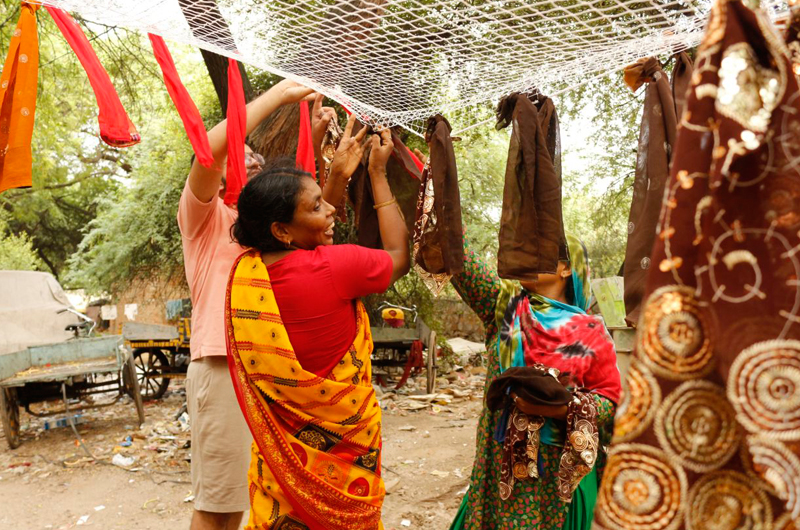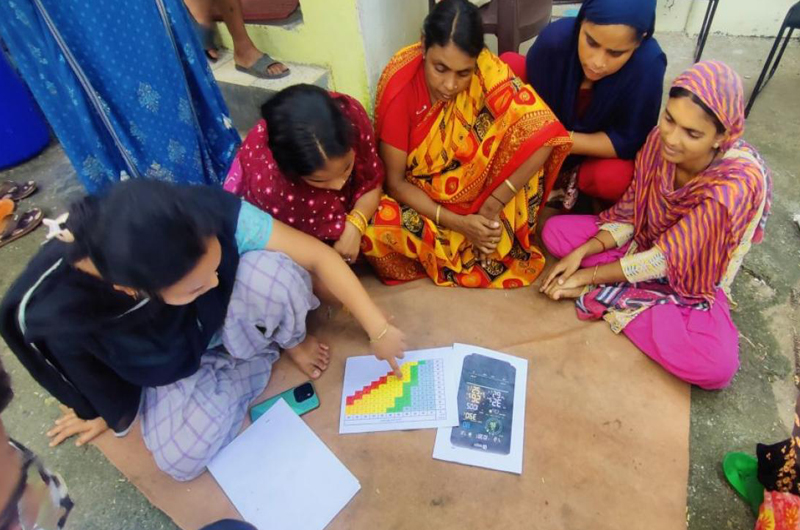A women-led initiative in New Delhi proactively mitigates the adverse effects of heatwaves. This article is from STS Global
Women residing in low-income, high-density settlements such as Vivekanand Camp in Chanakyapuri, Delhi, have undergone specialised training to address the challenges posed by heatwaves within their communities. This initiative, a collaborative effort between STS Global, a technological and environmental catalyst, and the Chintan Environmental Research and Action Group, empowers the women to utilise an automatic weather station (AWS) to gather vital data on temperature and humidity levels each morning throughout the scorching summer months.
Using the popular messaging platform WhatsApp for swift communication, the women cross-reference the collected data with a heat stress chart provided to them. Based on the readings, they signal potential risks by displaying green (indicating fatigue), yellow (signifying a risk of heatstroke), or red flags (indicating an imminent threat of heatstroke) on visibility boards strategically placed throughout the community. The residents of these settlements are already familiar with the recommended actions corresponding to each colour.
Referred to as Climate Sakhis (sakhi means friend), this group serves as a crucial link in ensuring the timely dissemination of weather advisories, presented in actionable formats. Moreover, they undertake the responsibility of maintaining this community-centered early warning system. Additionally, they have taken proactive steps by creating shaded communal areas using recycled fabric and nets, particularly essential in environments where temperatures can soar up to 6 degrees Celsius higher than the surrounding areas, owing to the low-income and high-density nature of these settlements.

2023 was the hottest year on record ever, according to World Meteorological Organization. With the Indian Meteorological Department predicting another harsh summer, Dr Anshu Gupta, co-founder, STS Global said, “Indoor heat, and not outdoor heat, is the real killer. With the summer coming up, it’s the women, children and elderly who are indoors for prolonged periods in the day. This has a host of negative physical and mental health impacts, and makes early warning systems and community-led interventions all the more important.”
These interventions were piloted in Vivekanand Camp; with the summer being just around the corner, such interventions can be scaled and replicated to other communities and states that face heat stress. “We studied the climate pattern and the social fabric in the communities and understood that the ecosystem can only thrive with active participation of the Climate Sakhis. They have been an inspiration at the forefront to make the difference and save some valuable lives,” Dr Gupta added.
Employing technology like the AWS guarantees the capture and analysis of real-time, precise, and community-specific data. When combined with communication platforms such as WhatsApp, it establishes a streamlined and rapid system, ensuring that all smartphone-equipped residents can access and benefit from the advisories provided by the Climate Sakhis promptly and effectively.
Note: STS Global is a techno-environment catalyst that enables end-to-end humanitarian interventions at scale and makes them accessible to the last mile citizen. It is building and empowering resilient communities beyond boundaries. Established in 2009, the organisation provides community-centric, scalable, and tailor-made transformative solutions to climate-induced risks and disasters. It is engaged with public and private institutions in the areas of sustainable shelter design, assessment & planning, skilling & capacity building, knowledge management and using technology for a social cause. STS has served and delivered scalable impact in 8 countries – India, Nepal, Bangladesh, Afghanistan, Maldives, Philippines,Indonesia and Sri Lanka for notable national and international partners such as World Bank, GIZ, Government of India, C40, Reliance Foundation, Swiss Development Cooperation, UNDP, ADRRN.
(Courtesy: indiawaterportal.org)



 from Webdoux
from Webdoux